The triumph of protest? What the collapse of Israel-Premier Tech means for global cycling
Does Israel-Premier Tech becoming NSN Cycling represent a victory for protestors? And if so, what does it mean for global cycling in an era when geopolitical fault lines are impossible to ignore?
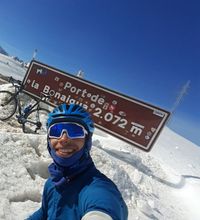
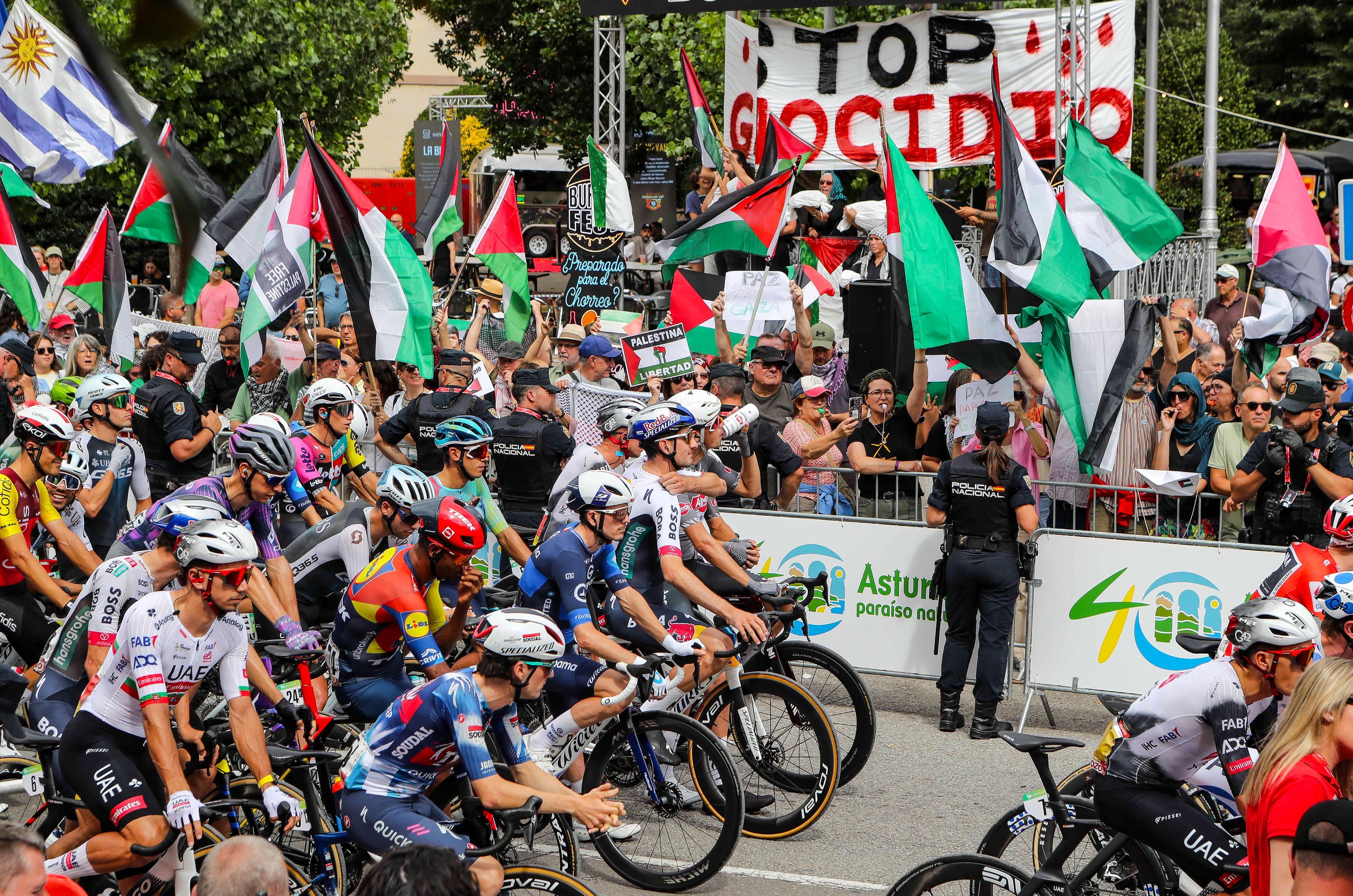
The latest race content, interviews, features, reviews and expert buying guides, direct to your inbox!
You are now subscribed
Your newsletter sign-up was successful
The protesters at this year's Vuelta a España, many thousand in number, demanded that Israel-Premier Tech (IPT) be shut down. The team, as owner Sylvan Adams put it, refused to cower, and the UCI, cycling’s governing body, rushed to their defence. Yet the unstoppable force of a protest movement that has swelled across the world has finally shifted the immovable object: Israel-Premier Tech have become NSN Cycling, owned by an international sports and entertainment company, and backed by Swiss investment bank Stoneweg.
A fragile ceasefire is now in place in Gaza, but does the pause in hostilities – and IPT’s forced rebrand – signal the end of one of cycling’s most fraught tangles with geopolitics? Or does it mark a new era in which protest and public pressure exert greater influence on cycling, blurring the line between politics and sport as never before?
Peloton politics
IPT is an Israel-registered team privately funded, chiefly by Israeli-Canadian billionaire Sylvan Adams, who is overtly supportive of the current Israeli government. Protests against IPT at races, which began in 2023 with a scattering of flags and banners, grew in scale as Gaza’s humanitarian crisis deepened during 2025, ultimately forcing the cancellation of the final stage of the Vuelta a España. Riders on rival teams pleaded for the team to suspend its racing activities, fearing for the safety of riders. In private group messages seen by Cycling Weekly, one prominent rider from a rival team said: “The fact they are racing under the name of a country committing genocide means that politics and sport are very much already intertwined… protesters have nothing to protest if Israel is not participating in sportswashing here.”
At the height of the protests, Israeli prime minister Benjamin Netanyahu took to social media to congratulate the team and Adams. “Great job to Sylvan and Israel’s cycling team for not giving in to hate and intimidation,” Netanyahu posted. “You make Israel proud!” Adams himself told Israeli media that if the team had withdrawn from the Vuelta, it would have spelled “not just the end of the team, but of all the other teams”. His implication was that other teams overtly linked to states would find themselves targeted. “Tomorrow they will demonstrate against the teams from Bahrain, the UAE and Astana. There is no end to the boycotts.”
Amid escalating protests against IPT, the balance of power shifted. Their headline sponsor Premier Tech and bike sponsor Factor privately informed team management that unless “Israel” was dropped from the name, they would withdraw their support. Faced with that ultimatum, the team announced it would relinquish its Israeli identity for the 2026 season, re-emerging under a new name and nationality. Both sponsors pulled out anyway. The end result was extraordinary – and made it hard to avoid the conclusion that, this time, the protesters had prevailed.
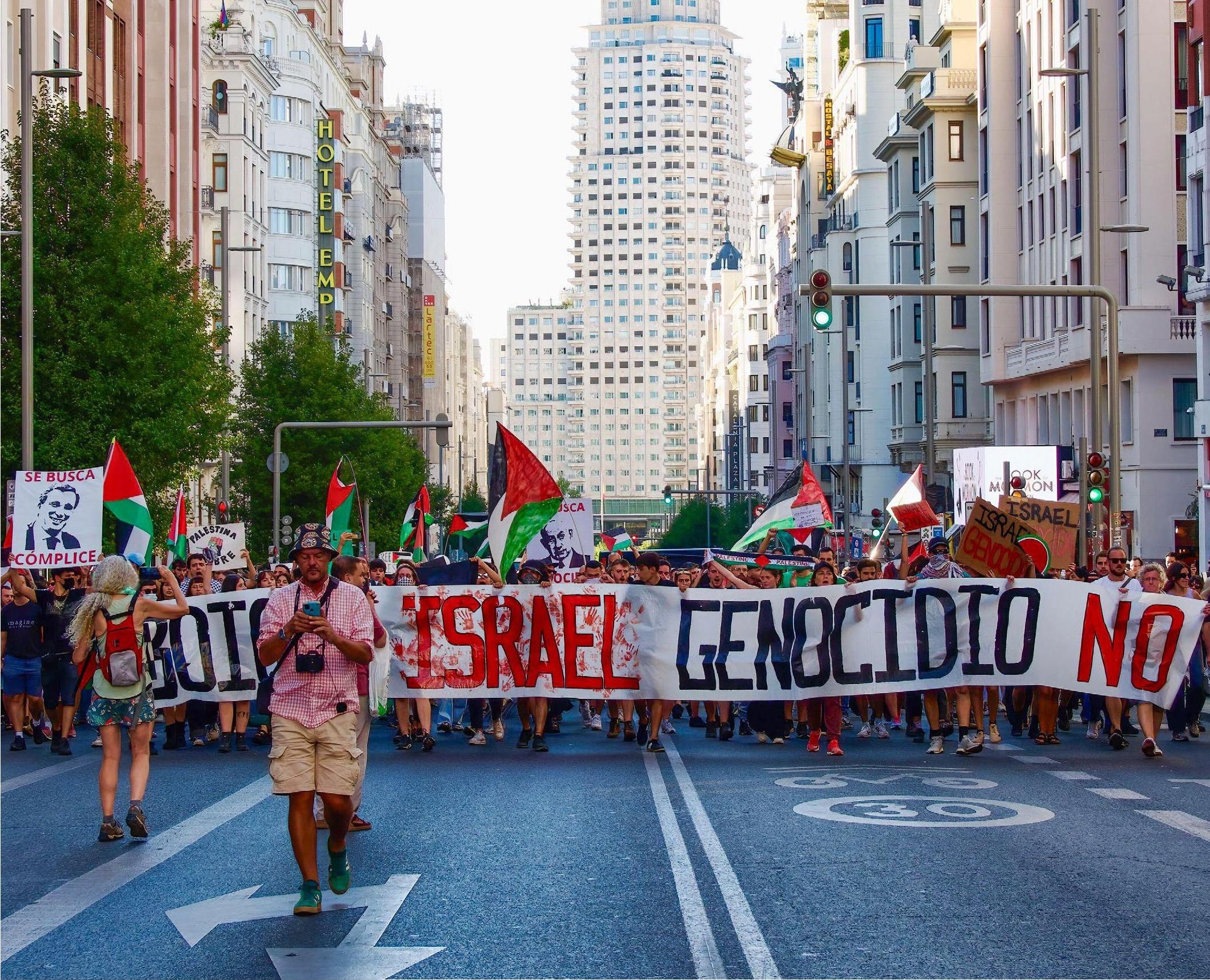
Protests put paid to the final stage of this year’s Vuelta
In announcing the climbdown and decision to rebrand, in early October, IPT stated that the team “is, and always has been, a sporting project,” but that recent events made the “team’s owners and management recognise the need for change”. The statement added: “In sport, progress often requires sacrifice, and this step is essential to securing the future of the team.” As for Adams, he had “chosen to step back from his day-to-day involvement and will no longer speak on behalf of the team”. Adams has remained silent on the matter, but in a recent op-ed in the Jerusalem Post, he expressed gratitude to President Trump and paid homage to Netanyahu for “leading a nation through war”.
When CW asked the team whether Adams would remain their owner and principal benefactor, a press officer replied: “Regarding Sylvan, at this point in time, there are no changes to his ownership or funding of the team.” That response raised questions: if Adams – a figure long associated with the Israeli government – continues to bankroll the team, is it really any less aligned with Netanyahu’s Israel? And if it remains an Israeli team in all but name, will the protests really fade away?
The latest race content, interviews, features, reviews and expert buying guides, direct to your inbox!
Answers were perhaps provided on 20 November, when media and entertainment group NSN (Never Say Never) announced an acquisition of the team. Though NSN is a Spanish-based company, the team will be registered in Switzerland. According to well-informed journalist Nacho Labarga of Spanish newspaper Marca, Sylvan Adams has relinquished all of his stakes in the team. The team’s general manager, Kjell Carlström, will remain in place.
Irreparable relationship
In August, just before the Vuelta got under way, Derek Gee, IPT’s highest-profile rider, revealed that he had terminated his contract with the team, owing to “certain issues [that] simply made my continuation with the team untenable”. He later expanded on his reasons, stating: “This decision was not taken lightly – it followed an irreparable relationship with the team principal, as well as serious concerns related to racing for the team, both from a safety and personal-belief standpoint that weighed heavy on my conscience.”
In an attempt to establish whether protest against the team would continue, Cycling Weekly contacted the Palestinian-led Boycott, Divestment and Sanctions (BDS) movement. Its spokesperson Stephanie Adam told us: “Regardless of the team’s name or the flag under which it races, it continues to be sponsored by Israeli government-partnered [organisations] complicit in Israel’s genocide in Gaza and its underlying 77-year apartheid regime oppressing millions of Palestinians. Until the team convincingly cuts all ties with genocidal Israel and ends its sportswashing of Israel’s regime of military occupation and apartheid, we will continue to call for peaceful protests at races to exclude it.” Israel rejects allegations of genocide and apartheid.
Where does this leave the riders being offered contracts with the team for 2026? Responding to Cycling Weekly, one agent who has brokered numerous deals between riders and IPT shrugged off the prospect of ongoing controversy: “Now the team is good for many riders,” he commented. Another agent, whose client received death threats for choosing to ride for IPT, told us he was satisfied that the team was no longer “a toxic entity” and was once again an attractive destination for riders: “The funding and ownership won’t [any longer] be perceived as blatant promotion of Israel,” he added.
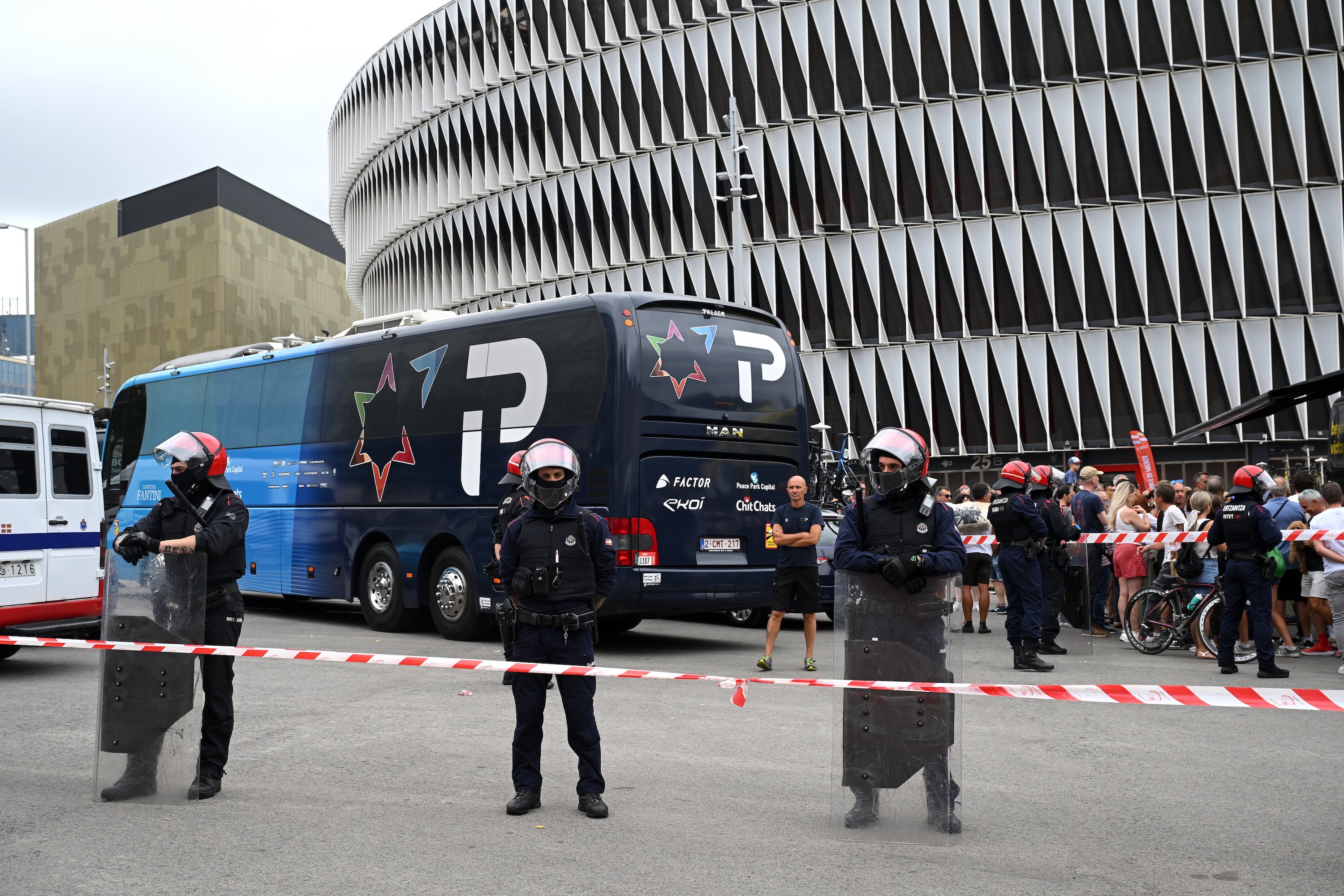
UCI president David Lappartient stood firm behind IPT during the protests, and criticised Spanish prime minister Pedro Sánchez and his government for expressing solidarity with demonstrators. Responding to the Vuelta protests, the UCI stated that it “strongly condemns the exploitation of sport for political purposes in general, and especially coming from a government”. Yet, as CW previously reported, the governing body faced accusations of double standards – particularly given its continued alignment with the IOC’s ban on Russian and Belarusian teams following Russia’s 2022 invasion of Ukraine.
Lappartient’s predecessor, Brian Cookson, believes the time has come to consider barring teams from having nation states as title sponsors. “Cycling’s USP is that its teams are named after a sponsor, and if that sponsor causes public controversy – whether it’s a regime or a product – it’s no surprise when there are repercussions for that team,” Cookson told CW. When those nation states command armies and wage wars, those repercussions are, as we have seen, extremely impactful.
“We need to start looking more carefully [at this issue],” Cookson continued. “It’s not easy or simple; there’s no clear magic solution, and it requires a lot of talking, patience and diplomacy – but the UCI could change its regulations about who and what is acceptable as a team sponsor. Nation states could be prohibited in the same way alcohol and tobacco companies are no longer allowed.” The chances of the UCI doing this, however, given the vast sums of money at stake, appears slim.
“RACES ARE AN EFFECTIVE STAGE FOR PROTESTS”
Vulnerable to disruption
With the root-and-branch change of identity, the team will be hoping to repair its reputation and quell unrest, yet the fragile ceasefire and recent turmoil have pushed cycling into an even more precarious, protest-prone era. IPT is not the only team that has come under fire; UAE Team Emirates-XRG has faced scrutiny over its links to the UAE state, which several human rights groups allege is supporting actors in the conflict in Sudan.
The sport is by nature vulnerable to disruption – hundreds of kilometres of public road can never be fully secured – and in this sense protesters retain the upper hand. Now they have proven they can halt a race, the potential for further such disruption is undeniable. As Michał Kwiatkowski said after the Vuelta: “From now on, it’s clear for everyone that a cycling race can be used as an effective stage for protests and next time it will only get worse, because someone allowed it to happen and looked the other way.” The Ineos rider was critical of the UCI and race organisers for not acting sooner to protect riders.
The 2026 Tour de France will open with a team time trial in Barcelona, Spain, which, for protesters – given how they derailed IPT in the Vuelta’s TTT – may present a tantalising opportunity for even higher-profile disruption. As for next year’s Vuelta, a rumoured finale in the Canary Islands may face opposition, since Antonio Morales, president of the Gran Canaria Island Council, stated that the island would not host the race if IPT were permitted to compete. Cookson acknowledges that the threat to the sport has not passed. “We’re not immune to these scenarios emerging again in the future,” he said. “We have learned that we are vulnerable to public protests, and we need to be more conscious of that. The Vuelta was a warning call for all of us.”
Who is Sylvan Adams?
Sylvan Adams was born in Canada in 1958. His Romanian-born father, Marcel, was a Holocaust survivor, and emigrated to Canada from Israel in 1951. Marcel founded the real estate company Iberville Developments in 1958, and Sylvan managed the company for almost 25 years. In 2015, Sylvan moved to Israel.
A decade ago, he became a co-owner, with fellow Israeli businessman Ron Baron, of the Israel Cycling Academy team. Adams has called himself a “selfappointed ambassador-at-large for the state of Israel” and has said that the team’s riders “ride for Israel”, even if IPT have never received significant government funding. He was instrumental in bringing the start of the 2018 Giro d’Italia to Israel, and is reported to have a close relationship with the country’s prime minister Benjamin Netanyahu. Adams is also the president of the World Jewish Congress (Israel Region), a role in which he encouraged US president Donald Trump to attack Iran’s nuclear facilities in June. He effusively praised Trump in October for brokering the Gaza ceasefire.
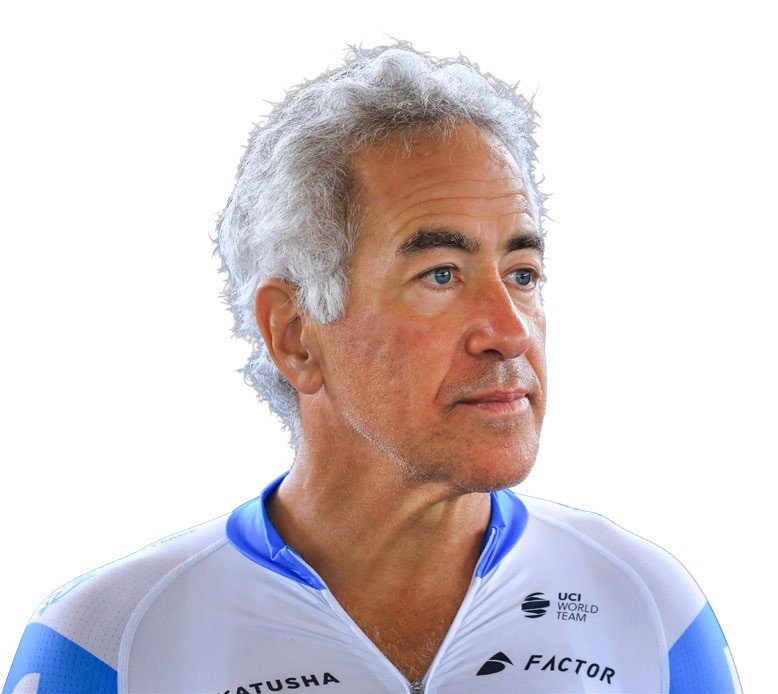
This article is an updated version of a feature first published in the 6 November 2025 print edition of Cycling Weekly magazine – available to buy on the newsstand every Thursday (UK only) while digital versions are available on Apple News and Readly. Subscriptions through Magazine's Direct.
A freelance sports journalist and podcaster, you'll mostly find Chris's byline attached to news scoops, profile interviews and long reads across a variety of different publications. He has been writing regularly for Cycling Weekly since 2013. In 2024 he released a seven-part podcast documentary, Ghost in the Machine, about motor doping in cycling.
Previously a ski, hiking and cycling guide in the Canadian Rockies and Spanish Pyrenees, he almost certainly holds the record for the most number of interviews conducted from snowy mountains. He lives in Valencia, Spain.
You must confirm your public display name before commenting
Please logout and then login again, you will then be prompted to enter your display name.
